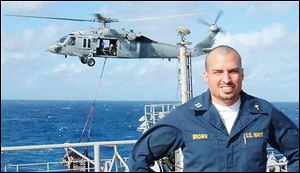
A chaplain's challenge: Marines' relationships
6/16/2007
Lt. Dale Brown, an ordained minister and U.S. Navy chaplain from Columbus, is serving in the Persian Gulf.
LAKESIDE, Ohio - The Rev. Dale Brown of Stillwater United Methodist Church in Dayton has traded his clerical robes for military fatigues.
The 38-year-old minister is a chaplain in the United States Navy, having served two years on the USS Camden supply ship before being assigned to the 11th Marine Expeditionary Unit, which he described as "a fully contained combat unit" that can function for 30 days without any external support.
Lieutenant Brown flew to Ohio from the Persian Gulf to attend the annual convention of the West Ohio Conference of the United Methodist Church here, and is scheduled to leave next month to return to the Middle East.
In serving as spiritual leader for a battalion of 600 marines, he said the major concerns that his men and women troops have involve relationships.
"You're dealing with families that are a cross section of society, a lot of people outside the traditional church," he said in an interview.
A lot of the personnel are 18 to 22 years old, far away from home, and adjusting to the controlled environment of military life, he said.
In a Marine Expeditionary Unit, the troops never know if or when they might be sent to the front lines.
"In a way, that's more stressful than knowing you're going to be going to Iraq in six months," he said.
Family and relationship problems can be devastating to these young men and women stationed overseas, Lieutenant Brown said.
One marine, for example, found out that his wife had an abortion without consulting him, he said. Others receive "Dear John" letters in the mail or e-mail, or find out that their spouse or loved one has been unfaithful.
Although he conducts regular church services, it's the "informal conversations" that make him feel like he's really making a difference in the marines' lives, he said.
Enlisted men usually keep their distance from officers, he said, which makes it harder for him to earn their trust.
"I have to convince them that I'm really here for them," Lieutenant Brown said.
He'll sit down at their table in the mess hall, for example. And once one marine starts talking to him, others often follow.
Lieutenant Brown said he is anxious to return to the Middle East except for one thing: the heat.
"I heard it's going to be 130 degrees when we get there. I'm not looking forward to that," he said.
- David Yonke